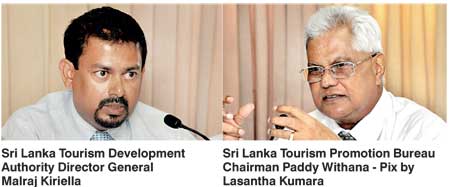Saturday Feb 21, 2026
Saturday Feb 21, 2026
Tuesday, 28 June 2016 00:34 - - {{hitsCtrl.values.hits}}
By Charumini de Silva
Tourism officials yesterday launched an ambitious set of regulations to give every hotel in Sri Lanka a star rating in a sweeping effort to bring service levels to international standards and implement a policy that has been in the pipeline for over a decade.
A new gazette on Classifications of Tourist Hotels with the aim of making Sri Lanka a quality destination and to streamline various aspects of the industry will be implemented by the Sri Lanka Tourism Development Authority (SLTDA). The original plan to introduce star ratings for all hotels was mooted in 2005 but failed to be carried out.
According to the Extraordinary Gazette No. 1963/28, all registered hotels in the country should be classified on a star class basis with every registered proprietor responsible for complying with the minimum requirements for all categories of hotels specified in the  rules for minimum capacities and facilities of tourist hotels.
rules for minimum capacities and facilities of tourist hotels.
Hotels will be reclassified every three years and during this time each establishment would be allowed the use of the approved symbol for that particular classification along with the name of the hotel.
Noting that sustainability of the tourism industry depends on standards,SLTDA Director General MalrajKiriellainsistedthe mechanism was essential to ensurehigh industry standards in the future.
Addressing a media briefing, he said all 344 registered hotels islandwide would be classified with the assistance of a seven-member Classification Committee. Out of the total 344 registered hotels, only 113 hotels are classified while theremaining 231 needto be standardised.
Kiriellanoted the new codes had been formulated considering new trends and the star rating was on par with international standards.
“We are targeting about 4.5 million tourists and earnings of $10 billion that would create 800,000 jobs by 2020; thus having a star-rated mechanism is useful to ensure quality standards in the industry,” he pointed out.
SLTDA is also in the process of establishing an Enforcement Unit under the Legal Division to take action against hotels that disregard the latest regulations.Kiriella also warned that SLTDA was in the process of amending the penalty fee from the current Rs.500 to up to Rs.200,000.
“We hope to change the penalty of hotels that do not follow regulations. The penalty fee will range from Rs.25,000to Rs.200,000.”
A major roadblock in implementing regulations, according tothe Director General,is the absence of accurate data on unregistered hotelsas it is not mandatory to register under the Tourist Board.
“Going by information we have from bookings.com and agoda.com, there are about 4,000 units out of which nearly 2,000 have registered with the Tourist Board. These are not hotels, but mostly inns, lodges and home-stay units,” he explained.
The SLTDA has now undertaken an initiative to register these businesses and have already covered several key towns including Unawatuna, Hikkaduwa, Sigiriya and Ella, and plan to expand to Negombo, Arugam Bay, Pottuvil, Jaffna and other popular destinations as well.“The objective is to register everybody,” he said.
In addition, 21 codes on home stay units, bungalows, apartment hotels, small luxury hotels, eco tourist lodges, tourist camping and caravanning sites, ayurvedic tourist hotels, heritage tourist hotels, independent tourist restaurants, travel and tour services operations, tour guiding services, vehicle safari operations, tour vessels operations, elephant back safari, tourist shops, spice gardens, spa and wellness centres, water-based adventure activities, tourist theme parks and Ayurvedic tourist healthcare centres are being reviewed by the Legal Draft Division to be gazetted in the next few months.
Responding to questions on the potential impact on tourism from Brexit, Kiriellastated: “We are reviewing it. There could be some impact, but it is too early to comment. We will be able to notify after a study in due course.”